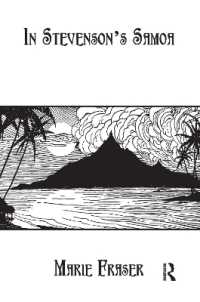- ホーム
- > 洋書
- > 英文書
- > History / World
Full Description
How did peasants experience and help guide Russia's war, revolution, and civil war? Why in the end did most agree to live as part of the Bolshevik regime? Taking the First World War to the end of the Civil War as a unified era of revolution, this book shows how peasant society and peasants' conceptions of themselves as citizens in the nation evolved in a period of total war, mass revolutionary politics, and civil breakdown. Aaron Retish reveals that the fateful decision by individuals to join the Revolution or to accommodate their lifestyle within it gave the Bolsheviks the resources and philosophical foundation on which to build the Soviet experiment and reshape international politics. He argues that peasants wanted more than land from the Revolution; they wanted to be active citizens. This is an important contribution to our understanding of the nature of the Russian Revolution and peasant-state relations.
Contents
Introduction; 1. The masses mobilized: militarization, conscription, and war in the village; 2. Peasant citizens: freedom and revolution in the village; 3. Peasant and nation in revolution; 4. Bringing the state back in: land disputes and Soviet power in the village; 5. Civil war and the village; 6. The resurrection of Soviet power in the countryside; 7. Big tent Bolshevism: rule by consent and the construction of the Soviet polity; 8. The citizens' hunger: famine relief efforts and the civil war economy; Conclusion.








